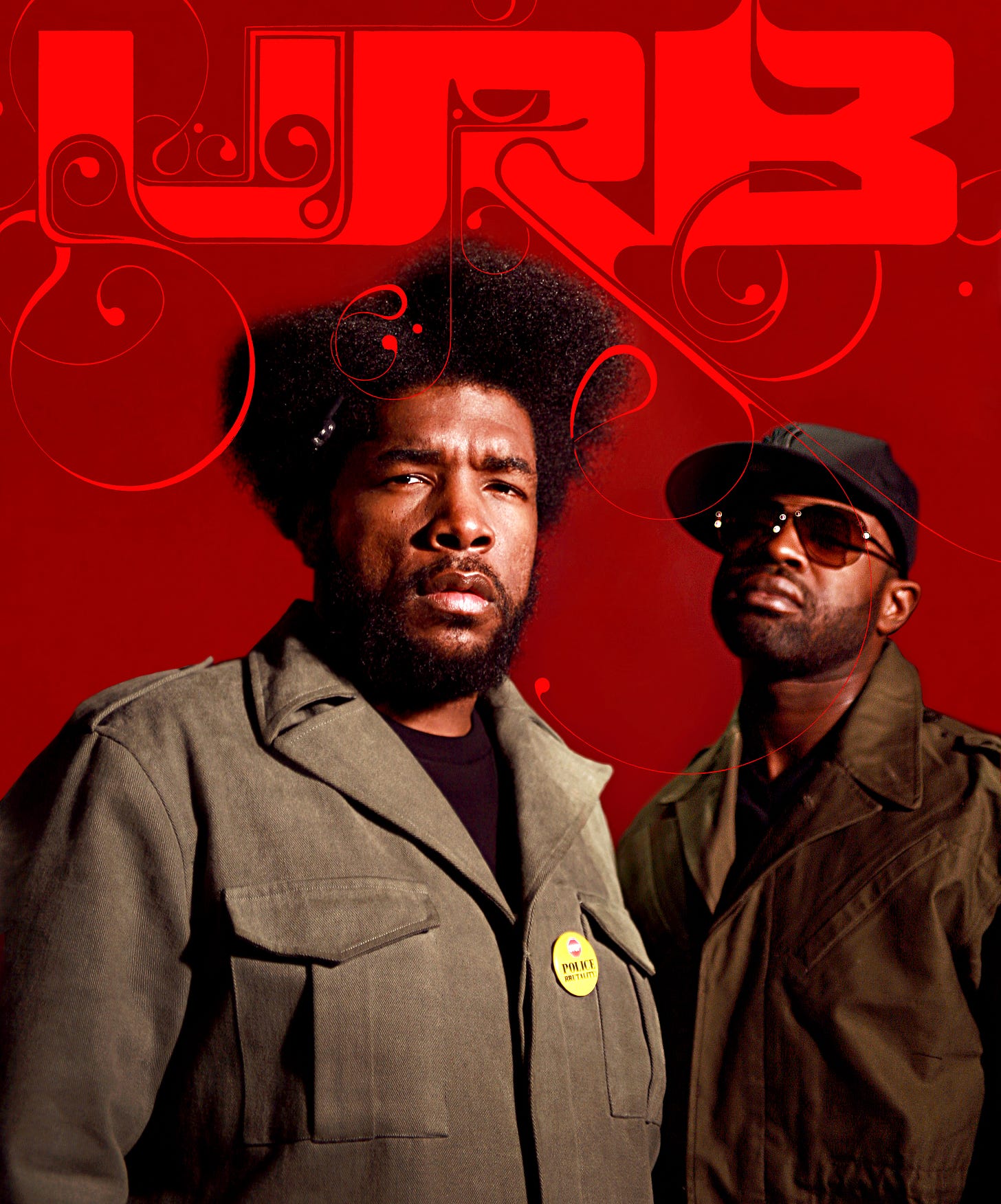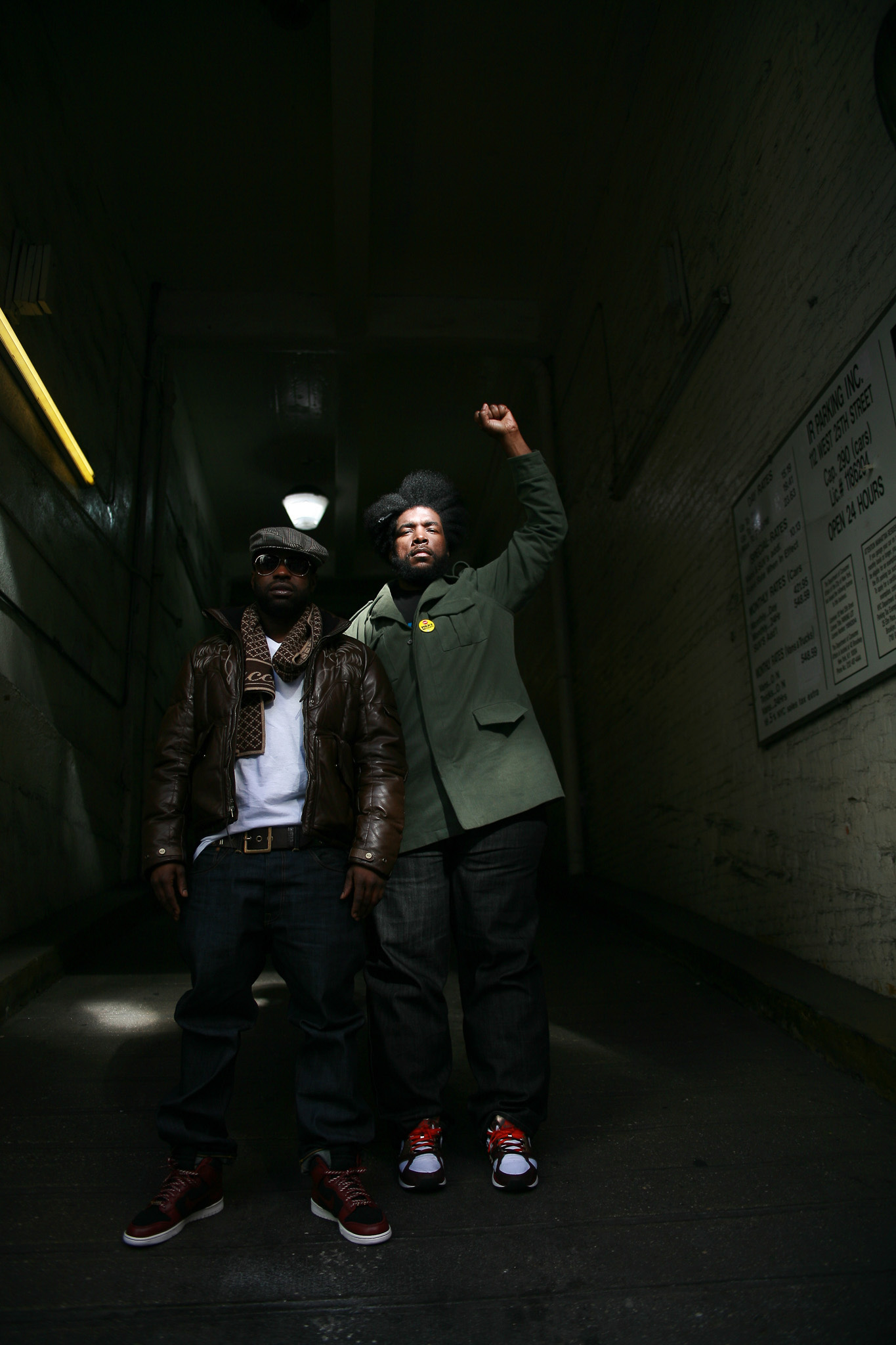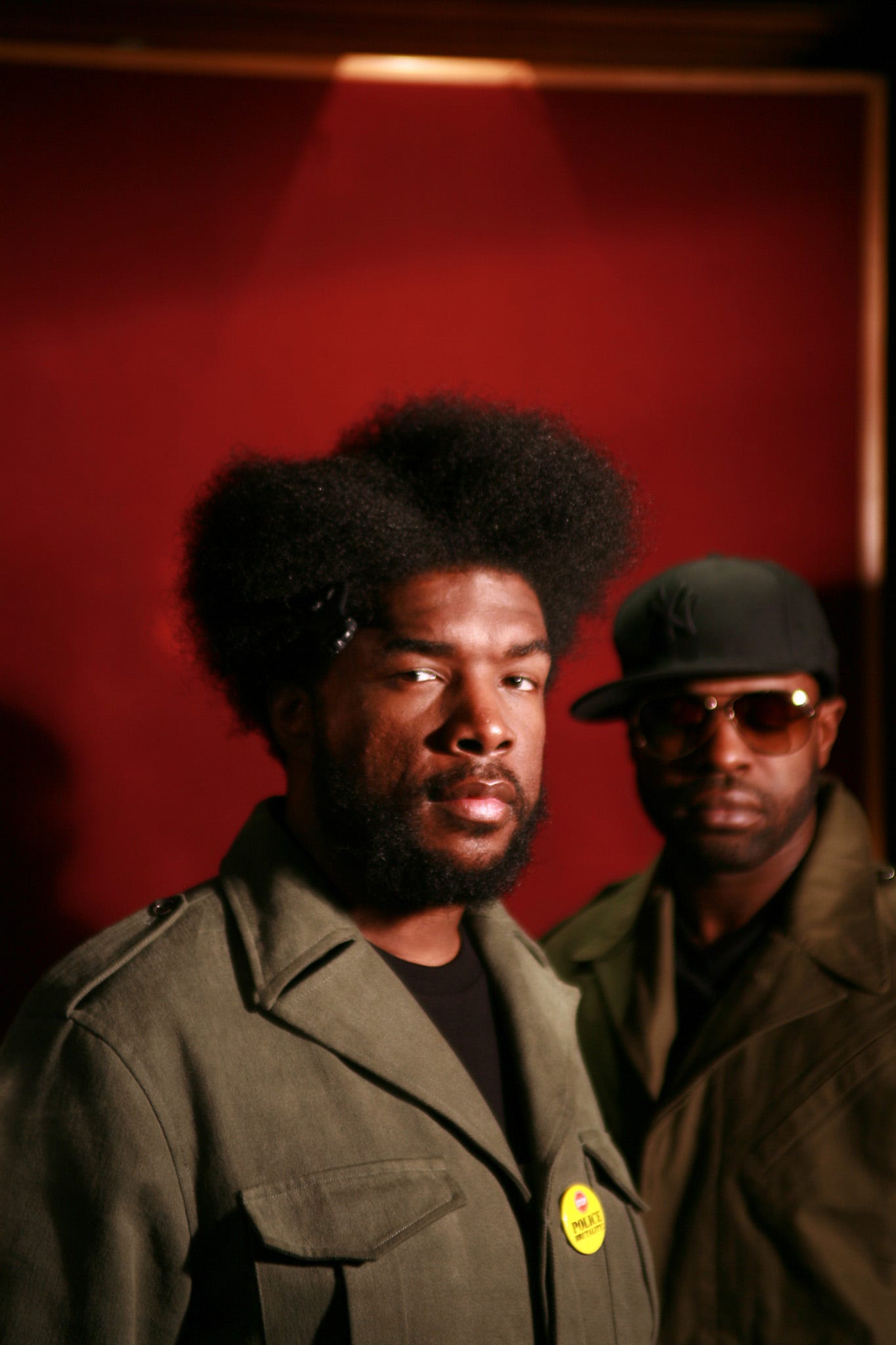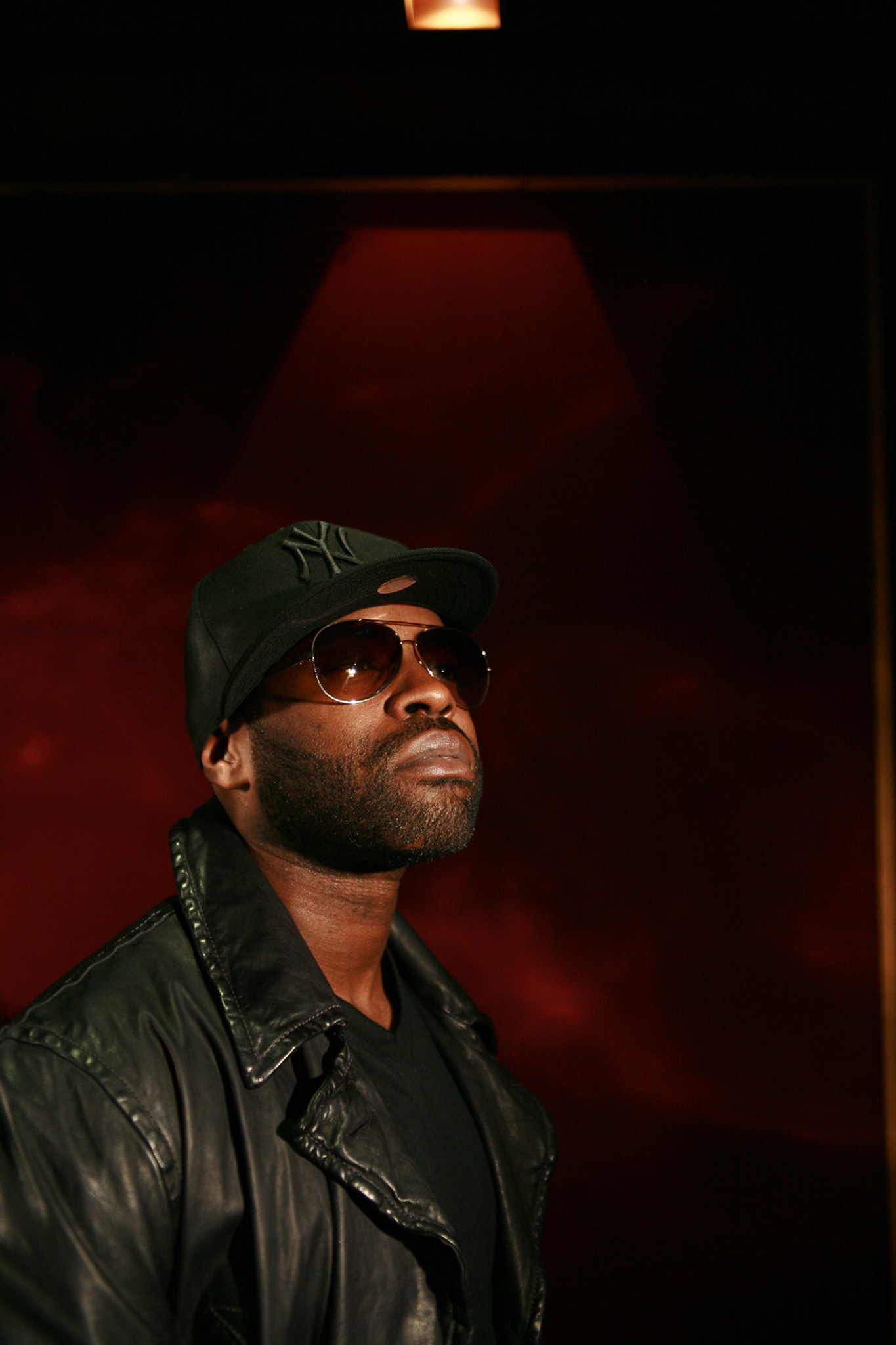The Roots Stay(ed) Alive
Fifteen years ago, at hip-hop's 35th, could its greatest live band have predicted their (still) legendary status?
I said I’d do it—Nonstop hip-hop posts in celebration of its 50th birthday. At the risk of sounding like a broken 45, I’m going to drop a few gems from the vault over the next several days. Don’t worry; your regular scheduled programming will return momentarily (or dive into the growing archive).
My criteria for this blog are simple: Can we gain insight from this piece years after it was first published? Is there a theme or prescient thought worth (re)examining? And does the hero still inspire us today?
Take a look. Drop a comment. Tell a friend. With Love, Raymond.
Published in Issue 153 May/June 2008
The Roots Stay Alive
The Illadelph Halflife has turned into a decade-plus-deep catalog of top-notch hip-hop, but where does rap’s premier band go now?
By Kevin Polowy
Photography by Phil Knott
Ahmir “?uestlove” Thompson is about to set the record straight. The congenial Roots drummer with a football lineman’s frame and unmistakable ‘fro is sitting dead-center in the middle of a large leather couch in the green room of a Chelsea recording studio. “We work hard and get paid accordingly,” he says, with barely a hint of conceit. “No one’s crying that they’re in the poor house. We do extremely well for what we do.”
What they do. It was the title of the second single off their third record and the amount of play its sneakily satirical video pimped on a popular reality TV channel that once upon a time aired music programming helped elevate The Roots from niche alt-rap group to hip-hop mainstay. It’s what they’ve done—and done extremely well—that’s gotten them here. They’ve defied the odds and far surpassed hip-hop’s short life expectancy rate. They haven’t just survived; they’ve flourished. And with April’s Rising Down, they’ve now released an astounding ten albums. (Or is it only eight? More on that later.)
“The secret to longevity is us being able to achieve some sort of fluidic chemistry,” says Black Thought, né Tariq Trotter, the Illadelphia, Pennsylvania outfit’s other charter member. It’s an hour later, and the 35-year-old wordsmith is beat, blunted, and slouched in the corner of the same couch, tired eyes atypically visible sans trademark shades and Yankees cap tipped low. “We have an understanding of each others’ boundaries and each others’ limits.”
“As you get older, there’s definitely the fear of the unknown, of what the future holds for you.”
—?uestlove
?uestlove attributes their success to following the Tao of Chuck D. While The Roots were on tour with Public Enemy in 1998, just prior to the release of Things Fall Apart, the revolutionary MC laid out for them his two-part equation for bringing the noise well into the future: Take it one day at a time, but also think in terms of chess moves. “While the average rapper thinks in terms of six months from now what they’ll be doing, they don’t really want to think, ‘What am I doing in 2011?’” explains ?uestlove. “Especially for us. Do we really want to think, ‘Is there going to be room for us in this game when we’re 40?’ There’s absolutely nothing wrong with that. But as you get older, there’s definitely the fear of the unknown, of what the future holds for you.” (For the record, Public Enemy has released 11 albums.)
While longtime fans probably look back and assume The Roots were just getting into the groove in ‘98, in truth, they were at a crossroads. They had popped onto the scene five years prior, riding their homegrown hero status in the 2-1-5 and year-long European residency (fueled by their first release, Organix) into a contract with Geffen Records. They proceeded to drop the jazztastic hip-hop classic Do You Want More?!!!??! in early 1995, and Native Tongue listeners swallowed it right up. They brought the jazz-like A Tribe Called Quest and fused it with poetics à la Digable Planets but with a decidedly harder Gang Starr-like edge. They were the natural descendants of blossoming sound. Or at least that’s how we saw them. “We thought we were included in the first round of alternative hip-hop music,” admits ?uestlove. “We thought we were part of the Jungle Brother-De La-Tribe-Arrested Development-Gang Starr train. But in reality, we got to the station just a little bit too late, and the train went off the platform.”
“We thought we were included in the first round of alternative hip-hop music. We thought we were part of the Jungle Brother-De La-Tribe-Arrested Development-Gang Starr train. But in reality, we got to the station just a little bit too late.”
—?uestlove
That train’s departure gave life to the next movement. ?uestlove says they realized it about halfway through making 1996’s Illadelph Halflife: “There’s no such thing as individual success in music unless it’s part of a movement. Philadelphia International. The disco sound. The G-Funk West Coast sound...The Down South crunk...Snap music.” In 1997, with the help of Geffen and MCA, The Roots very deliberately scoured the waivers and label rosters, setting the wheels in motion to eventually lure like-minded free agents into their fold. They began with Common, who they pried from Relativity. They went after Mos Def, Talib Kweli, and Pharoahe Monch. They attempted to get Slum Village and lost them, but still signed J Dilla.
“We pretty much just built the left-of-center roster around us,” says ?uestlove. Around the turn of the century, the movement expanded to neo-soul. There was Erykah Badu, who crooned the Jill Scott-penned hook on “You Got Me,” the lead single on their fourth LP, 1999’s Things Fall Apart, helping the group land a Grammy. But there was also D’Angelo, Alicia Keys, Scott, N’Dea Davenport, Musiq Soulchild, Bilal, and Floetry—all became intertwined with The Roots crew. It was the movement. “That’s why all of a sudden, Common and artists who only sold 200,000 units previously can now sell a million units,” ?uestlove says.
?uestlove is downplaying the impact of a certain Chicago superstar dropout in referencing the success of Common’s chart-topping last effort, Finding Forever, to make his point. And though the movement has certainly paid dividends for The Roots, there’s still a prevalent notion that the paper chase is harder on them than it is on their contemporaries (thus the drummer’s earlier clarification). And that’s understandable. The Roots have watched as act after act they’ve grown with blows up. First, there was The Fugees. Then OutKast. Then, Lauryn Hill as a solo artist. Then the Black Eyed Peas. Then Cee-Lo with Gnarls Barkley. It’s liked every act that headlined a Smokin’ Grooves tour with them found greener pastures. And don’t forget Kanye West. Or Eve or Beanie Siegel, two Illy Philly residents who used guest spots on Roots records as launch pads to lucrative commercial careers.
“But I kinda get the feeling that if we were awarded that amount of success, I don’t think we’d be here,” says ?uestlove. Here, at the moment, is the aforementioned Battery Studios in Manhattan. ?uestlove and Black Thought, along with their Def Jam and Okayplayer reps, have just hosted a Rising Down listening party for a tightly packed room full of journalists, industry types, and fellow musicians and friends like J.Period and Jazzyfatnastees’ vocalist Tracey Moore. Talib Kweli dipped in just in time to hear his guest verse.
“I think the struggle and the hunger and the absolute molasses-like process that our career has taken is the only reason why [we’re here],”
—?uestlove
“I think the struggle and the hunger and the absolute molasses-like process that our career has taken is the only reason why [we’re here],” ?uestlove continues later. “This album is past hunger. This album was starvation.”
This album draws nothin’ but love from the listening partygoers. And it’s surely an accomplishment, both strikingly alike and vastly different from Roots records past. Thematically, the general consensus is that it’s their darkest record yet, which says a lot coming on the heels of their previous release, 2006’s divisive Game Theory. If things didn’t “Feel Right” in ‘06, how are they feeling now? “Yeah, I think things are becoming worse in the world, at breakneck speed,” says Black Thought, who makes like Gore and addresses inconvenient truths on his very first verse. “What I write is just the result of what I’m dealing with. And if greenhouse gases and global warming wasn’t directly affecting me, then I wouldn’t be putting that out there.”
Yet, the Euro-release ends with The Roots’ poppiest, most radio-friendly track yet—and just the name gives that away, “Birthday Girl”—featuring vocals from Fall Out Boy frontman Patrick Stump. Their first single, the song is sure to draw comparisons to The Gym Class Heroes—and destined to provoke drunk white girl dance parties in unwitting Irish bars everywhere.
Sonically, the album’s driving force is synth, yet there’s a far wider range of styles at work than we’ve seen from the group over their past three efforts, from the Fela-inspired Afrobeat of “I Will Not Apologize” to the wild, upbeat style they refuse to call go-go (per the insistence of guest Wale) on “Rising Up.”
Lyrically, the album is flooded with guest spots, a far cry from the court Black Thought’s been holding down across Phrenology, Tipping Point, and Game Theory. Mos Def kicks things off along with Styles P on the title track. Extended family members Dice Raw (who Black Thought credits for writing 80 percent of the hooks) and Peedi Peedi (aka Peedi Crakk) drop knowledge on “Get Busy,” a cut reminiscent of Illadelph Halflife. Roots protégé Porn (warning: a Google search can be distracting) and Dice Raw coat the next-level “I Will Not Apologize.” Malik B responds to the Phrenology number “Water” on “I Can’t Help It.” Common spits harder than he did through most of Forever on “The Show.” Truck North and Saigon also appear, and Lupe Fiasco and Q-Tip were both supposed to (the former got pneumonia the day they were set to record) but don’t.
And then there’s that fella by the name of Patrick Stump. While a Roots-Fall Out Boy collabo may sound like the stuff of derivative major-label manufacturing, that’s actually just our cynical presumption. The song was actually birthed during sessions for their 2004 record The Tipping Point but deemed too far right (or is it too far left?) to make what they considered a “ground zero” LP. And ?uestlove met Stump years ago and instantly bonded with him: “I never met anyone that outdoes me on any type of musical trivia,” he says. Like the 1984 Prince concerts.
?uestlove is prepared for the potential—ahem, fallout. He’s prepared for the “judge and jury,” “the floggers” that turn out every so often to rag on crossover success stories (some prefer the term “sellouts”) like the Black Eyed Peas. But he makes a damn good point: “If you look at the hip-hop marketplace, shit is totally pop! What is your position on ‘Throw Some D’s’? Or ‘Superman’? If you’re gonna ride all the way and start taking people to court, then I don’t want to catch you singing ‘Good Life’ and then turn around say ‘I hate pop hip-hop.’”
The “floggers” also got on ?uestlove’s case last year when the drummer announced The Roots would be releasing Rising Down, “their 10th album.” Do the math, count the propers, and you’ll end up with eight studio outputs. Fans, of course, will realize the group also considers 1999’s The Roots Come Alive and 2005’s Home Grown! The Beginner’s Guide to Understanding the Roots (released in part to satisfy contract obligations with Geffen before leaving for Def Jam) as unique entities and part of the official Roots repertoire. “For me, it’s a new album if at least 60 percent or more of the material is unheard new stuff,” ?uestlove says, adding that their live arrangements evolve so much over the course of 240 shows a year that they’re essentially new versions on Come Alive, while Home Grown! is stocked with remixes, B-sides and live cuts.
…
The storied history of The Legendary Roots Crew—with all of its various incarnations—rivals some of rock’s greatest shape-shifters. Of the collective that asked Do You Want More?!!!??!, only founding fathers ?uestlove and Black Thought remain, though Malik B was welcomed back into the family with the release of Game Theory. Original keyboardist Scott Storch left after the seminal sophomore release and eventually manifested himself into a super-producer. Human beatbox machine Rahzel was always a fleeting presence, but few expected vocal turntablist Scratch (2001) and longtime bassist Leonard Hubbard (2007) to bolt. A guitarist named Ben Kenney left almost as soon as he arrived to join Incubus. Now, keyboardist Kamal Gray sits as the third most tenured member, while guitarist Captain Kirk Douglas, bassist Owen Biddle, sousaphonist Tuba Gooding Jr. (no relation), and percussionist F. Knuckles are still in the familiarizing phase with their fan base.
Though many credit Stetasonic as hip-hop’s first live band, the “100 percent organic,” live instrumentation of Do You Want More?!!!??! solidified The Roots as not only the most successful but also the most visionary and influential. Through the mid-to-late-‘90s, it seemed as though live rap bands would start blossoming from every angle. The seeds were surely planted, but the results often led to just another wannabe dismissed as a Roots clone. Today, there are extremely few true live hip-hop collectives drawing national attention. The Bay Area’s Crown City Rockers, for one. And then...?
Black Thought looks at it from another angle. He says live musicians have thrived in hip-hop, dating back to the mid-‘90s with groups like The Fugees and Black Eyed Peas. But can anyone name the drummer for either of those groups? “That’s more politics within bands,” he says. “The contractual agreement between the performers.” He’s clearly proud of his group’s influence on today’s standard, though. “In this modern day that we’re in, no one that’s at that level, your Kanyes, your Lupes, your Jay-Zs, you don’t see any of them go out and perform without a band. Not at any performance that they want to be taken seriously. And we’re highly responsible for that.”
The Roots should know about Jay-Z shows. They’ve been Jigga’s house band for years now, backing him for his legendary 2001 Unplugged, again in 2003 at his Madison Square Garden “retirement” show, and then again in 2006 at the 10th-anniversary performance of Reasonable Doubt at Radio City Music Hall. Look beyond The Roots crew, and Black Thought is right: Everybody is rocking with a live band, be it Wu-Tang Clan (with El Michels Band) or Slick Rick (with The Eclectic Collective or The Adam Deitch Project). Even Lil’ Wayne’s gotten into the live act.
Many hip-hop heads, though, have long speculated that The Roots’ one-for-all bandstand has claimed casualty the rank of its rhyme spitter in the eternal debate over rap’s best MCs. It’s indisputable that Black Thought lived in the shadows of solo MCs like Talib Kweli and Pharoahe Monch, and it didn’t help matters that his long-awaited, ill-fated solo album got shelved (rumors that it was put to bed because of shoddy quality mostly subsided after a few of the tracks ended up on Phrenology).
It surely can’t be a coincidence that somewhere around or between the release of Phrenology and The Tipping Point, the tide began to turn, and suddenly, the hip-hop community began to speak out on behalf of a long-underrated MC. It had to help that those albums, along with the subsequent Game Theory, all seem to put more emphasis on “showcase” tracks for Black Thought’s fiercely raw lyricism, songs like “Thought @ Work,” “Web,” and “Here I Come.” Rising Down’s merciless “75 Bars” should take the argument even further. But if you insist on pinpointing one song that catapulted Black Thought into “Top 5” discussions, look no further than The Tipping Point’s brilliant “Boom,” “featuring” Big Daddy Kane and Kool G Rap. The lyricist’s second- and third-verse imitations of those hip-hop icons were so spot-on (Kool G lisp and all) that a handful of music reviewers actually reported them as guest spots.
“A lot of my shit was ahead of time ‘cause I modeled my shit after people that was so ahead of their time.”
—Black Thought
“I do, but I don’t,” Black Thought says when asked if he pays mind to the hoopla over Most Dominant MCs. “I feel like times is changing. I feel like when I’m dead and gone, just like Biggie and ‘Pac and whoever else, people will maybe dig deeper and start to understand what it is that I’ve accomplished and really dissect my legacy. A lot of my shit was ahead of time ‘cause I modeled my shit after people that was so ahead of their time. I feel like people may not understand it yet.”
So do The Roots have any regrets? Black Thought still shows visible remorse over the controversy surrounding “You Got Me,” not only for handing off Jill Scott’s beautifully penned chorus to Erykah Badu but also for standing dormant as higher powers cast an actress to rap the then-unknown Eve’s bars in the video.
?uestlove talks about the bigger picture. Getting paid accordingly. What Chuck D told them. Watching year by year, everybody else getting the brass ring. The struggle and the hunger and the “absolute molasses-like process” that’s turned to starvation. “I think the reason you hear the hunger [on Rising Down], why you hear the starvation... could possibly be the fear setting in,” he says. “Will we have a future or not?’”
History says they damn sure do.











..2024